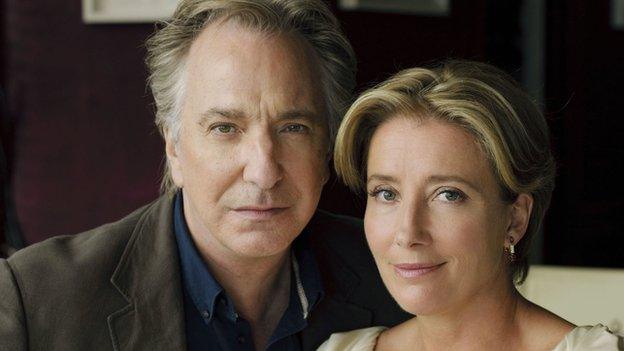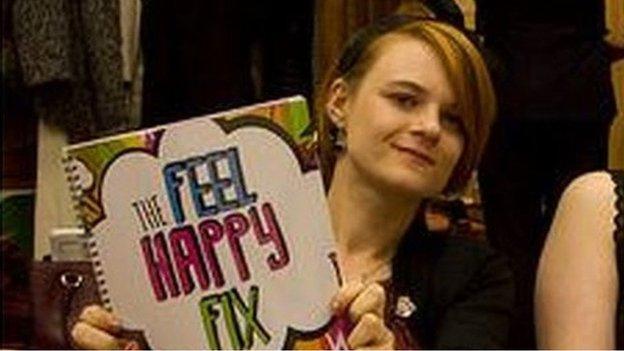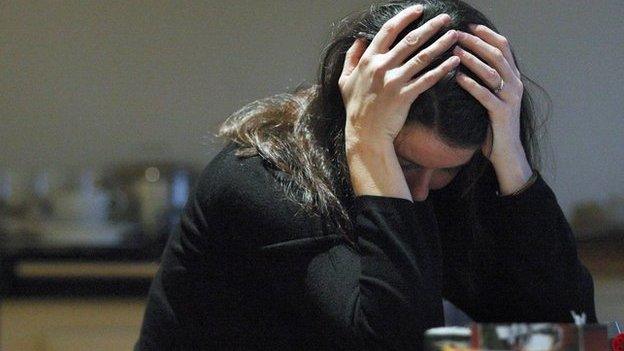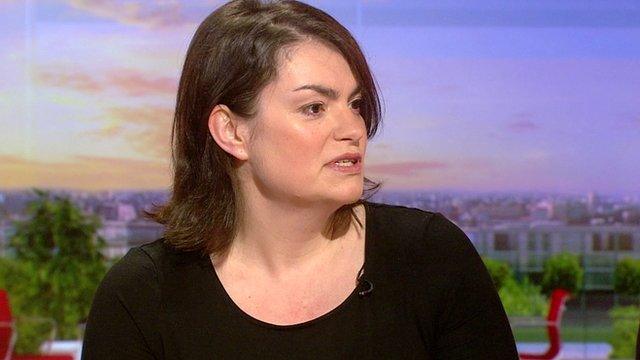Mental health equality call gets high profile backing
- Published

Alan Rickman and Emma Thompson were among the more high profile signatories
A campaign calling for an increase in funding for mental health services in England has been launched.
Over 200 celebrities have backed the push for mental health to be treated as seriously as other illnesses.
It was launched by former mental health minister Norman Lamb, Conservative MP Andrew Mitchell and former Labour spin doctor Alastair Campbell.
Health Secretary Jeremy Hunt said treatment had made "great strides" but more could be done to improve services.
The government increased overall mental health funding to £11.7bn in 2014/15.
But Mr Lamb said people with mental ill health "don't get the same right to access treatment on a timely basis that everyone else gets". He called it a "historic injustice."
His son was diagnosed with obsessive compulsive disorder at the age of 15 and Mr Campbell has spoken about his battle with depression.
Inequality in care
The NHS became officially responsible for ensuring the standard of care for the mentally ill was equal to that of physically ill people in 2012.
In the spring, the government pledged an extra £1.25bn largely for children's mental health over the next five years.

Analysis
Nick Triggle, health correspondent
In the modern NHS, a hip replacement is a pretty routine operation. More than 50,000 are carried out each year.
People normally get a referral from their GP and then go on to a waiting list. The majority go under the knife within a few months and are able to plan and prepare for the surgery to try to avoid too much disruption to their everyday lives. For most, it's a pretty easy experience compared with other operations.
But for people with mental health problems, it's a completely different picture. Four in 10 get a hip replacement only after being admitted as an emergency, according to a recent study published by the Nuffield Trust.
Consider that for a moment: their health - and presumably pain - has deteriorated so much that they are rushed in and operated on immediately.
What causes this? Experts suspect it's just another sign of how mental health patients lose out.

It also introduced the first waiting time targets in mental health, guaranteeing treatment within 18 weeks.
But the campaign says not enough has been done to address a continuing inequality in care standards and funding.
Norman Lamb MP: "Campaign is changing attitudes and combating stigma"
'Break the stigma'
The campaign highlights a lack of access to treatment, with three out of four mentally ill children receiving no treatment at all.
There are also concerns that people are moved around too much, including placing children in adult wards.
The life expectancy for people with mental health problems remains 20 years lower than for the general population.
A change of mindset is needed, Mr Lamb insists: "If we talk about it and treat it like any other illness, we can start to break the taboos, break the stigma."
Comedian Frank Skinner, former footballer Ian Wright and presenter Graham Norton are also among the high profile names to back the campaign along with a number of supporters who have spoken up about their own experiences with depression, including Ruby Wax and Emma Thompson.
Singer Prof Green has spoken about depression and one of his songs tackles the issue
'Historic injustice'
While accepting that the NHS is under pressure at the moment, Paul Farmer, Chief Executive of the charity Mind, said: "When people don't get the right help at the right time, the risk is that they become more unwell and need more intensive - and expensive - treatment further down the line."
The cost is estimated at billions of pounds a year in "loss of work, in payment of benefits, and the impact on families," Mr Lamb said.
While campaigners acknowledge that progress has been made in this area, they say the levels of investment are not being matched with that of physical health.
Jeremy Hunt said the government had invested more money in mental health than ever before.
"We have made great strides in the way that we think about, and treat, mental health in this country," he said.
"Whether it is our talking therapies reaching more than three million people, the police working with mental health nurses to aid those in crisis, or school counsellors helping young people with eating disorders, we are making good progress.
"But we are committed to doing more. This campaign can play a vital role and we are making sure everyone has the care they need when they need it, seven days a week."
Education Secretary Nicky Morgan added: "Mental health is a priority for the government and for me personally.
"It is unacceptable for any young person to be denied the opportunity to fulfil their potential and it's essential more young people are aware of their own mental wellbeing."
- Published18 October 2015

- Published14 March 2015

- Published20 January 2014
